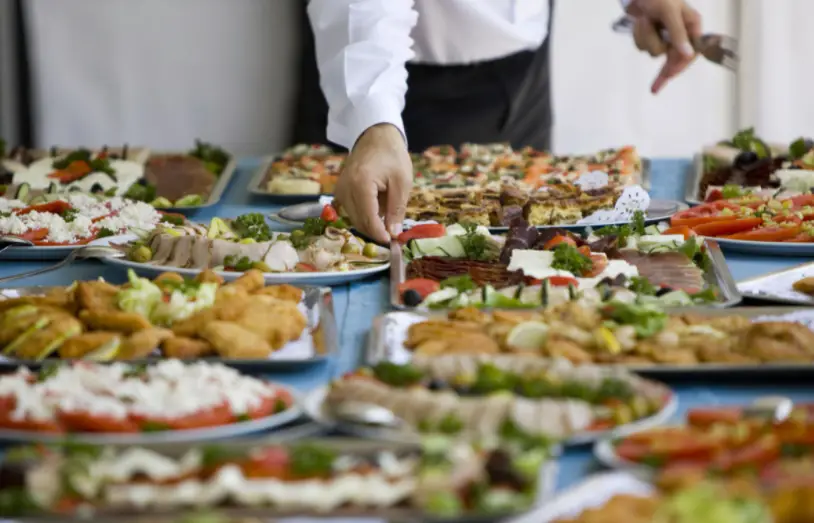Information presented on this web page is intended for informational and educational purposes only and is not meant to be taken as legal, financial, investment or tax advice. We do not accept any responsibility for any trading or investment related losses. Please review our disclaimer on before taking action based upon anything you read or see.
Starting a catering business in California from your home is your own choice, but you can legally make, serve, and sell a wide range of food options. Because in California a catering businessman is one who prepares food for its clients to eat and enjoy in the place of their own choice. You can get greater flexibility by working in a commercial; kitchen, but it will cost much. Diving in a catering business in California has its legal requirements, so if you want to know about the details. In this guide, I will tell you how to start a catering business in California.
How to Start a Catering Business in California

If you’re interested in starting a business in California, you can do that by following these steps:
- Choose a business structure
- Choose a perfect location.
- Find suppliers
- Choose the business entity.
- Get license and permits
- Ensure health and safety measures
- Arrange policy statements and contracts
- Get business insurance
- Hire employees
Choose a business structure
You will need to choose what type of business structure and prepare and file any necessary documents. California has to default statutory laws for general partnerships, limited partnerships, corporations (including S-Corporations), “limited liability companies,” and “professional corporations.
” While general partnerships don’t need much paperwork, they give each partner the right to manage and full liability for all debts.
Write up a partnership agreement if you choose this structure. A corporation protects personal assets from debts and lawsuits incurred while operating; shareholders’ assets are protected. To protect your business and yourself, consult an attorney experienced in working with small businesses and taxes.
For more information on these structures, visit the California Franchise Board’s guide.
Related post: How to Start an Edibles Business in California.
Choose a perfect location.
Once you have chosen a business structure and obtained your business license, you can find a location for your new catering business in California. Here are some basic steps for finding the best place to start your business:
- Research potential locations using resources like Google Maps or Yelp.
- Make a list of requirements that must be met by each location (for example, adequate parking space or whether your target audience frequents the area).
- Set aside time to visit different areas and talk to property managers or tenants about rental rates, lease terms, insurance requirements, etc.
- Once you have found an ideal location within budget constraints, work out a deal with the property manager, so you get the best possible terms for your business.
For more information on the basics of finding a location, visit Starting a Business in California.
Find suppliers
Building up a portfolio of reliable suppliers can save time and money when you are ready to open. Start by asking potential suppliers about pricing, delivery dates, and financial requirements.
Choose the business entity.
Whether you plan to start a catering business as a partnership or sole proprietorship, you should start the business in a legal form that saves you from personal liability like a corporation or a limited liability company.
Catering business runs through the involvement of other businesses and homes on the traditional means, and dealing face to face interaction with many people who eat food that you make and the employees working with a lot of physical activity, as in this business since the pandemic there is growing up to 150 %.
According to entrepreneur.com, if you want to step into a catering business, the average investment is likely to be $10,000 to $50,000.
License and permits
To operate all types of catering businesses need some forms of business permits from a county health authority or city, as the details can be different depending upon the involvement of the health authority.
The law of California also needs an employee or manager who is on duty to offer the state food safety certification.
You have to provide several types of documents with your health permit application.
- A copy of your menu.
- A copy of your state food safety certificate
- A statement that defines your kitchen commissary will open
- A floor plan of your kitchen with the details of equipment, sinks, and storage space
- The details of safe food handling practices
As a part of your catering business, if you want to serve alcohol, you have to get a special permit, a caterer’s permit from the California Department of Alcoholic Beverage Control, and a business license for every party in which you will serve alcohol.
MEHKO Inspectors will survey the home kitchen, food storage, onsite eating area, equipment and utensils, toilet rooms, janitorial, cleaning facilities, and refuse storage areas.
All businesses in California must have a state-issued business license; some may also require licenses from their county or city. The exact steps for getting a license vary by business and location. Licenses usually last one to five years and must be renewed annually or biannually (for example, during the owner’s birthday month).
For more information on licensing requirements, find where you plan to operate your business on the U.S. Small Business Administration’s website or ask an attorney about starting your business in California.
Health and safety
Health and safety are vital because the catering business offers people ready-made food and runs by following the essential rules and regulations regarding food health and safety designed by the California Retail Food Code.
Many matters come under the code servers like temperature for storage of food and cooking, handwashing, ventilation, employee storage areas, liquid wastes, floors, and other places.
Policy statements and contracts
Different clients are of different opinions about the provision of services that your catering business will offer. It will be your own will that you should note all the details in writing and in advance like what you can do for your customers.
You should upload your policies on the internet whether you have them or not; you can also provide the documents in writing form to your clients before starting your catering business.
For instance, if you cater to your client’s homes, you should consider the following things.
- Where you will prepare the food
- Who will be your clients
- Price of several items
- Payment modes
- Policy for the cancellation of the order
- Policy for the storage of food
Most of the issues will follow the same rules as the catering business.
Read More: How to Start a Clothing Business.
Insurance
There are many risks in the catering business, like slipping and injuring employees while cooking and preparing. The diners may have injuries with the broken glasses or hot liquids or someone seriously ill from the prepared food.
These issues are more than the risks like fires, property damage or theft, and other personal injuries and property damage issues. It will help if you try to hire a professional insurance agent who is good in the insurance field and has professional experience writing the insurance policies for the employees involved in serving and preparing food.
Try to make the complete property coverage, and including the business property from crockery to stoves should be on your list if your employees get injuries.
Make sure that you have an excellent and practical liability policy, as this will include the boiling and spilling of tea and coffee on the dining table and those employees who are gravely ill by eating your prepared food.
Moreover, your insurance policy should cover the proper vehicle insurance for your employees and yourself when travelling to and from your customer’s businesses and homes.
For insurance, your catering business budget revolves around $1,2000 per year.
Employees
Most home-based catering businesses have minimal employees, and the turnover you will get from this element will be relatively frequent. You should be aware of the basic employment laws, rules, and regulations like workers’ compensation, illegal discrimination, and operating the hiring procedures. Concerning hiring employees in a particular field may need:
- To make a practical job application that does not have illegal questions.
- Hire employees without violating the seeking knowledge of illegal information and check the references to make the pre-employment inquiries.
- Ask such questions in an interview that are legally permissible and also useful.
It would help if you also remembered specific laws related to employment in the booming catering business, like rules
related to several training and certificates regarding food handling and preparation and minimum wages for tipped employees.
Like all other countries, there are employment rules. Almost 25% of the restaurants will not reopen with the same number of employees. Many talented culinary creatives need employment opportunities.
Things to Consider in Making Money by Catering Business

There are various things to consider that you can keep in your mind to make money by catering business such as:
- Take the supplies and equipment on rent until you make a name in the catering company.
- Outsource many items and things to other event planning vendors
- Hire a temporary agency to find your employees
- Specialize in the list of items to make a niche for your catering business
By aggressively marketing and up-selling each entrepreneurial opportunity, the catering sales director brings in procedures and accomplishes financial objectives with the choice of location in catering. The catering sales director gathers event details and passes them on to the organizer for execution.
In the United States, according to Glassdoor company, the average salary of a catering manager is $47,915 per year. In addition to the services of the catering manager, the marketing director can also increase the rising sales of home-cooked food as proof that they should adopt the act.
Keep excellent financial records.
As a general rule, you should always keep receipts for money spent and income received. You may need these records to claim expenses or deduct losses on your tax returns. It’s also important to know how much you made last year so you can plan accordingly for this year’s taxes and future years.
Manage day-to-day operations
As the owner of a new catering business in California, it will be up to you to manage daily tasks such as inventory management, hiring and firing employees, setting prices, etc. It is advisable to keep track of everything that happens within your company by creating an effective record-keeping system, so you don’t lose track of information.
Follow the law
One must be aware of legal issues related to running a business in California, such as local zoning laws, safety requirements for your employees, etc. Visit websites like Wikivorce and HG Legal for more information on catering business laws in California.
Stay competitive
Staying competitive is one of the best ways to ensure your business continues to grow and remain profitable. Strive to offer quality products at affordable prices so you can keep attracting new customers while maintaining good relationships with existing ones.
It’s also important to have a unique selling point that will help set you apart from other businesses in the area (for example, a catering company could specialize in gluten-free cakes or organic food).
Frequently Asked Questions
How much does it cost to start a food business in California?
On average, you have to invest 10,000$ to 50,000$ to start a food business in California.
How much does it cost to start a catering business?
To start a catering business, you have to invest up to $10,000 to 50,000$ for startup costs.
What is needed to start a catering business?
Choose the name for your business and business entity type, write a business plan, register your catering business, get an EIN, determine your pricing, train and hire your staff, and market your business.
Can I cook from home and sell?
According to California’s new rules, home cooks prepare and sell food out of their digs from January.
What food can I make and sell from home?
Home chefs in California may prepare and market certain low-risk foods under the Californian Domestic Food Regulations. It allows retailers to sell jelly, granola, and pastries, and not hot, residence dishes.
Is it legal to sell food on the street in California?
Yes, it is legal to sell food on the street in California if you have a permit from the county health department.
How much is a food license in California?
Prices range from $55 to $135, each employee and prospective employee of your bar, restaurant, or food truck should take a course and pass an exam to obtain a food handler card.
Can I sell tacos from home?
Presently, most states only permit individuals to sell meals via co-working spaces or professional eateries. The new legislation expands on the 2012 Californian domestic food regulations, enabling individuals to sell low-risk ready meals such as mash and packaged foods.
Can you run a catering business from home in California?
Yes, you can run a catering business in California by getting a permit from the county health department.
How do I start a small food business in California?
You can start a small food business in California by arranging the ID proof of the applicant, address proof of the applicant, proof of the business location, NOC from the owner, in case of rent, NOC from the fire safety society, bank account statement, TAN, to start a small business in California.
Conclusion
Though it is not an easy task, you should follow the rules and regulations. If you are fond of making a name in the catering business. So that it should be a legal business, including selecting the business entity, getting permits and licenses related to health and safety, insurance and policymaking and interaction. Also dealing with employees and customers.






